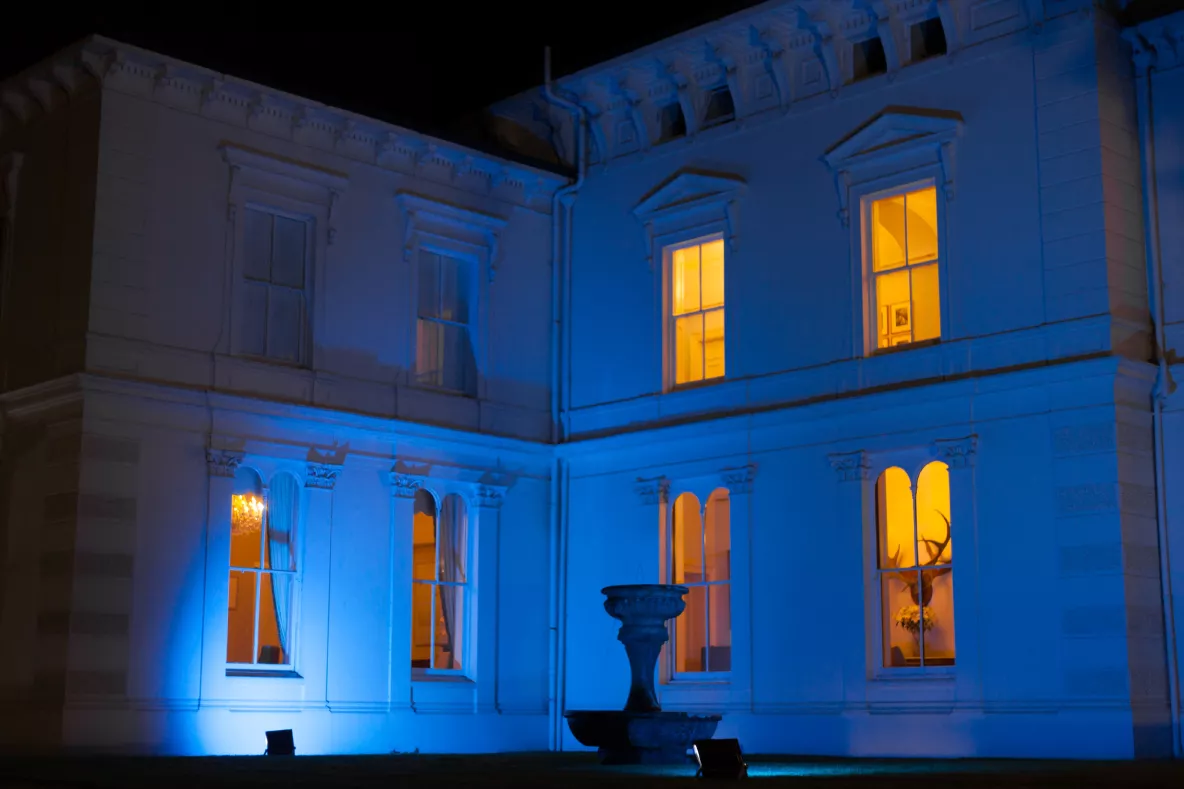
A number of buildings and fountains at University of Limerick have ‘gone blue’ to mark World Oceans Day.
Famous landmarks, buildings, businesses, schools and homes across Ireland are lighting up for the ‘Go Atlantic Blue’ campaign over the weekend of June 7-10 to celebrate our connection to the Atlantic Ocean, as part of World Oceans Day.
UL is no different, with a number of key buildings and fountains on campus lighting up to mark the global day (Saturday, June 8) that connects people worldwide in celebrating the ocean, its importance in our lives and how each of us can protect it, no matter where we live.
“Sustainability and the protection of the environment are key considerations for the University of Limerick, which continuously strives to adapt to a rapidly changing Ireland and face global challenges head on, particularly climate change,” said UL President Dr Des Fitzgerald.
“The University, while obviously not situated on the Atlantic, is very connected to the ocean given that the River Shannon winds its way through the heart of our beautiful campus and flows to the sea. Our researchers are tackling global climate and energy issues and our students use the Atlantic for both research and for play. It is also part of our drive to convince students to reduce the use of plastics on campus. This is why we were delighted to sign up to the Go Atlantic Blue campaign,” added Dr Fitzgerald.
The following UL buildings / fountains will have their colours altered for the campaign:
- Plassey House
- Foundation fountain
- Schuman fountain
- Plassey Close fountain
A number of other key locations in Limerick and its surrounds – including King John’s Castle and Shannon Airport – have followed suit, while nationally more than 40 different landmarks are expected to participate in the day by lighting up their buildings.
‘Go Atlantic Blue’ is being spearheaded in Ireland by the Marine Institute-led AORA-CSA (Atlantic Ocean Research Alliance Co-ordination & Support Action) against the backdrop of SeaFest 2019 (June 7-9) and Our Ocean Wealth Summit (June 9-10), both taking place in Cork.
It’s the first year to ‘Go Atlantic Blue’ with the aim of raising awareness of the vital role that the Atlantic Ocean plays in the lives of Irish people, no matter how near or far they live from the Atlantic coastline.
Dr Peter Heffernan, CEO of the Marine Institute, said: “Our ocean is our greatest natural resource and we see that most directly in Ireland with the vital importance that the Atlantic Ocean plays in our daily lives – from influencing the weather to facilitating our trade industry and from seafood to surfing off the coast. The Marine Institute is proud to support the ‘Go Atlantic Blue’ initiative from 7-10 June, particularly at SeaFest and Our Ocean Wealth Summit, and we encourage and welcome everyone to come onboard.”
Director of Atlantic Ocean Research Alliance Co-ordination and Support Action, Dr Margaret Rae, said that the initiative gives people all around the country a chance to show their appreciation for the Atlantic Ocean.
“Going Atlantic Blue is a way to draw attention to how each and every one of us experiences the Atlantic, what we love about our Ocean and how we can be that generation that makes a difference,” she said.
UL is home to Professor Daniel J. Toal, Ireland’s foremost expert in the area of marine and mobile robotics, a field that is of importance to several sectors including marine energy, airborne wind energy, industrial robotics, and autonomous vehicles. These are rapidly growing sectors, with potential for significant impact for Ireland.
Over the last 10 years Prof Toal has built a significant research track record in robotics, sensor platforms, instrumentation, controls, marine vehicles and offshore operation areas. He is the Director of the UL Centre for Robotics & Intelligent Systems (CRIS), which conducts research into several areas of mobile robotics, including marine energy, wind energy, manufacturing, and transport.
While Prof Toal would be UL’s most active researcher in the marine area, there are pockets of other activity too. The iCOMP Centre’s (Irish Composites Centre) work at the Bernal Institute in UL is focused on solving technical challenges of composite materials and conducts R&D including processing and manufacturing, testing, characterisation and simulation of composite material – some of which are used in the marine turbine industry. The work enables industry to integrate these strong, light-weight and corrosion resistant materials into existing and future products industry.
Prof Paul Weaver is studying the development of lightweight composite materials for use in wind turbine blades. Prof Noel O’Dowd from the School of Engineering also does research on the mechanical strength of wind turbine structures and oil rigs. Dr Anthony Comer is leading an EU Horizon2020 project called FIBRESHIP which looks at building more lightweight materials for use in the ship-building industry. Prof Dick Fitzgerald in the Biological Sciences Dept is developing foodstuffs and supplements from seaweed proteins, mostly for use in the animal feed industry.